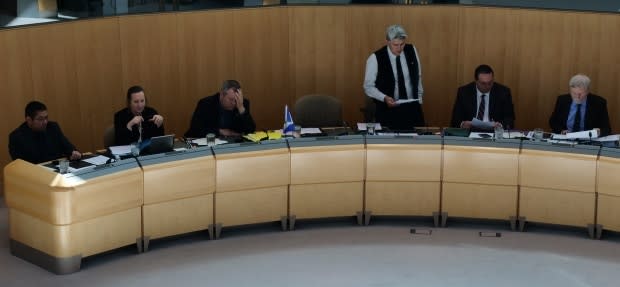OPINION | Candidates promise change, but who's ready to fight for it?
Electoral campaigns are exciting times — so full of hope and promise.
Lofty platforms and grand ideas for change give voters something to look forward to, but it's not easy for newly sworn in politicians to keep their promises once elected. The parameters of controversy can be high, especially when standing firm on a decision that has strong opposition.
Tackling controversial issues is not something that most politicians can do with diplomacy and those in the assembly going rogue run the risk of getting shuffled — or having voters less inclined on voting them back in next term.
So how does a member of the N.W.T. Legislative Assembly make a stand without putting their career on the line? How do you stand alone on an issue when main priorities in the assembly are determined by consensus?
Strategic initiatives are put forward by an appointed standing committee deemed proficient in reviewing the forecasting needs of the territory. This work trickles directly down into the recommendations for the annual budget.
But, since the government of the Northwest Territories is a public government, when people want change — when they actively lobby and advocate for it — they need to be heard and due diligence must be taken into effect. Even when strict agendas are already set, they must be shifted.
Like a bad home renovation, things get put off, dismissed and pushed aside and at the end of a four-year term, some politicians are worn out and tired because they are trying to get through piles of unkept promised legislation. Most of that will likely be waiting for the next set of MLAs to come in and pick up where they left off, and the cycle continues.
Safe accomplishments or lasting change?
The leaders of the next Legislative Assembly must ensure that they know what the real northern issues are in their assigned portfolios.
Health and housing are huge problems right now and have been for a long time. To many, the Housing Corporation is operating like a ruthless for-profit operation, when they should be looking for ways to mitigate the cost of housing. The mental health support system seems to be failing miserably, to the point that if a person wants help, it's a far cry until its answered, if it's even answered at all.
Indigenous governments should have the first and last say on northern land, and the territorial government seems to still be in denial of this.
What are the recent accomplishments of the N.W.T. government that have drastically changed the lives of people in the territory? We've seen sights set on increasing tourism, mining and resource development (which was and still is the Northwest Territories' biggest industry) and infrastructure, through the building of the Deh Cho Bridge, the development of the Mackenzie Valley all-season highway, a road through the mineral-rich Slave Geological Province, and the all-season road to Whati.
But besides these infrastructure projects, there has been slight progression on things that affect residents directly: public housing, education, or mental health supports, to give some examples. Even when it comes to infrastructure, these projects have been on the safe side; most relating to the decades-long dependence on resource development.
The government has been operating in a way that is very safe. Nothing changes. We haven't done anything worthy of attention or significance to the rest of the world, yet we are in a perfect location to be able to do just that.
Who will step up?
Which leaders of the next Legislative Assembly will stand out amongst the rest and opt to be on board for the coming technological revolution?
The N.W.T. is under a monopoly when it comes to internet, when the southern provinces have access to high speed packages with unlimited bandwidth. The N.W.T. doesn't have university legislation yet, despite the growing need, and our Grade 12 students aren't graduating with the rest of the country, many in communities requiring a year of upgrading after they graduate.

And if this next government wants to make the environment a priority, it's going to take a lot more than environmentalists to believe in setting up electric car power stations and green office buildings with solar roofs. It's going to take a set of agreed priorities that are outside of the box.
A large reason for this stagnancy is that the government isn't moving over and creating space for Indigenous governments that are rightfully owed their overdue sovereignty. Indigenous governments should have the first and last say on northern land, and the territorial government seems to still be in denial of this. I'd like to see which new leaders are going to stand up and openly recognize this as fact.
So, who will commit to the daunting task of becoming a renegade in the Legislative Assembly this next term? It takes a pounding of the fist on the table in order to get things done. It takes a certain residual demeanour and a tough attitude in order to be heard. But that's the only way to gain authentic credibility — and to drive real change.
This column is part of CBC's Opinion section. For more information about this section, please read this editor's blog and our FAQ.

